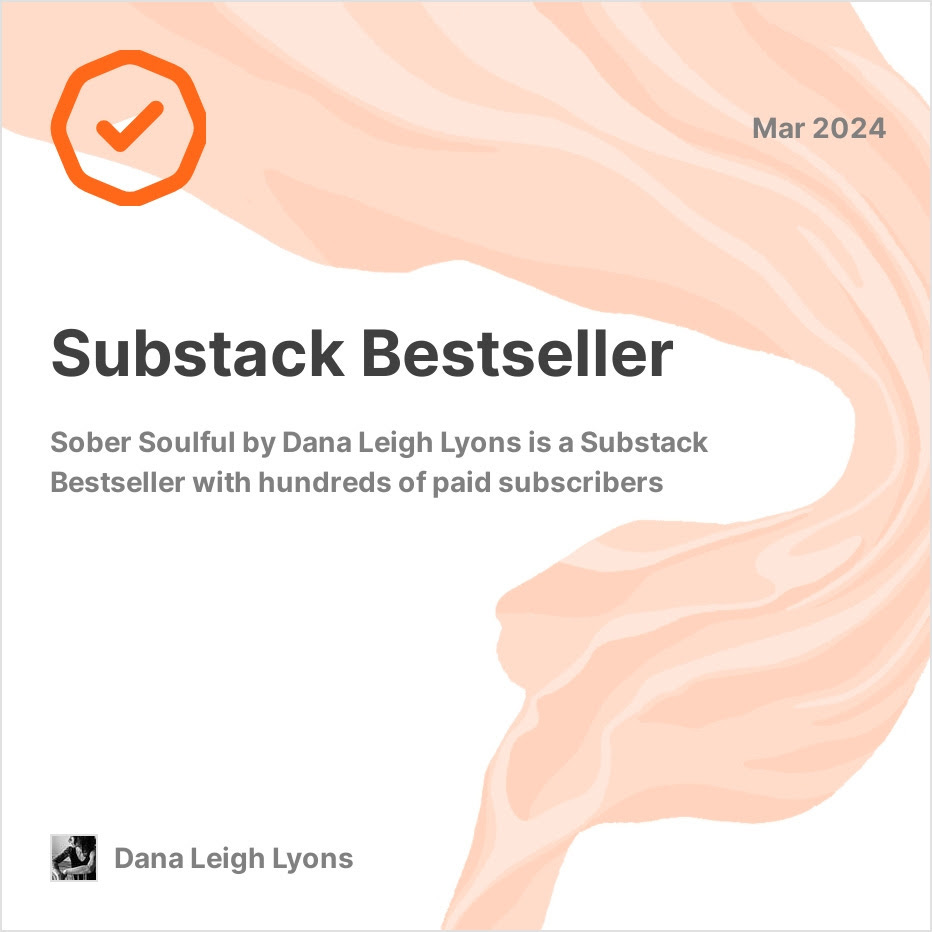My relationship with writing is changing
When writing the personal becomes calcification and deification of identity, memory, and story
In 2020, the year I got sober, I wrote an 80,000-word memoir. This was not the layered-and-literary, urgent-yet-timeless work I’d envisioned. This was the diary of someone desperate to declare her identity, set the record straight, and pin it all down on paper.
The title of this earnest-if-sophomoric, unpublished debut: Love of My Lifetimes: A Journey through Self and Souls. I KNOW.
My desperation felt urgent. My desperation pushed for proclamations and a final accounting: This is who I am. This is why. This is who wronged me.
Winding from preschool through present day, chapter by chapter, I laid out a string of romances and relationships gone wrong plus one painful false start that later went right: marriage then divorce then re-marriage to my then-and-now husband.
There was a preschool crush, first love, and first heartbreak. There was the boy whose religion forbade sex before marriage but deemed blow jobs okay. There was the guy with eight-pack abs who told me after I’d moved in with him: If you gain five pounds, I’ll break up with you. I want to love you, but don’t yet.
There was the artist who told me she’d found someone new just when I thought we were perfect. There was the professor whose work I wrote and who cheated on his wife with my classmate and on my classmate with me. There was the hot tree planter who invited me into her world of cool and cocaine. There was my first spiritual teacher who said his relationship was over and whose partner chased me out of the country. There was the mentor and doctor I fell hard for and who will always have a place in my heart.
There were girlfriends and boyfriends and loves and transactions and, eventually, a husband. There was being left and divorce and barely surviving. There was reconciling and being left again and a final breakdown of everything.
Then, when all hope seemed lost, there was a re-membering and remaking. Same bodies. Different people. New marriage.
If it was love, or love adjacent, I wrote about it. This book wasn’t just about me, my mistakes, my broken heart, and my reclaimed story—it was about everyone I’d ever let in. Now, four years later, I don’t regret writing it. I do see how it was lacking.
From expected to extraordinary
As these stories poured from my heart and onto the page, two things happened—one expected, one extraordinary.
The expected, usual thing is that I did my best to write the truth, and still, all those lovers and stories stepped forward as a caricature and an incompleteness. Sure, everything I wrote was true, it just wasn’t the whole of it. How could it be? We each hold worlds inside. We select particular versions for particular reasons.
May I present: The story that leaves me in a good light and just messy enough to be relatable, likeable, redeemable. The story that leaves out parts of me and even more parts of others. The story woven from singular threads pulled from the vast woof and weft of existence. From this fabric, I construct self. From this fabric, I construct others.
And yet, to my surprise, another thing happened. The story I set out to tell changed in the writing and changed me in the writing.
I noticed patterns I’d missed before. I noticed my patterns—playing out across lovers and lifetimes. I noticed that, in recreating those patterns, I was both villain and victim.
Slowly, almost imperceptibly, the caricatures on the page came to life. Slowly, almost imperceptibly, I came to love them again. I came to forgive them.
I also came to realize that nothing I’d written was complete enough or alive enough to do them or me justice. Writing that first, angry version was needed and healing but far from sufficient.
I tucked that particular manuscript away in a folder. It’s done its part. It healed me in ways I could’ve never imagined.
Why I’m writing about this now
But here and now, I’m in an uncertain and changing relationship with writing. For the first time in four years, I’m questioning what and how much to share. I’m questioning the usefulness, kindness, and aliveness of sharing so much of the personal.
Not because I’m afraid to share it. Not because I’m ashamed. But because, rather than freeing and healing me, sharing the personal sometimes feels like more of the same. It becomes a calcification and deification of identity, memory, and story.
Sure, identity, memory, and story can be freeing and healing. But also, they play the game of posturing, omniscience, and permanence. Lately, that game feels false and exhausting.
These days, I avoid looking at that long-ago writing. But if I were to go back for a rewrite, I’d zero in on myself as narrator through different ages and phases. I’d ask:
What did I want? What did I get? What didn’t I get? What was my role in that?
I’d then ask the same thing of every lover and other I chose to portray. I’d approach them with the love and forgiveness I was only able to access after writing the earlier, angrier, messier version.
What did they want? What did they get? What didn’t they get? What was their role in that? What was my role in that?
And I’d ask myself—I am asking myself—that same question now: What do I want, really? What’s my secret and even subconscious agenda? In my writing, my identity, my memory.1
If we strip away comfort and certainty and rightness. If we escape the Constraints of Correctness. The answer’s always the same: I want to exist. I want to belong. I want to matter. To matter is to be cared for. To be cared for is to be safe.
We can work our words into identities and stories in infinite ways. But in the end, I think we all want that: to belong, to matter, to be cared for, to be safe.
And so, I arrive with an agenda. And so, I construct narratives and claim some version of self. And so, I repeat and repeat and repeat, longing to be seen and be heard.
While there’s nothing “wrong” with any of this, I’m finding great value in going about it with honesty. I’m finding it especially valuable in this age of hyper-public, hyper-online sharing.
It’s easy to write snark and get clicks. It’s easy to rage on the page and get clicks. It’s easy, swimming in this online soup, to strip ourselves down and others down to our most scintillating, scandalous versions. And to box ourselves. And to claim This Is Who I Am And Forever Shall Be.
But is this truly delivering what we’re after? Is this our fullest, most alive version? I’m doubtful. And I’m not sure certainty makes the best writing.
Remembering the urgent, furious energy I brought to my unpublished memoir, I understand it… but no longer feel it. I don’t feel angry. I don’t feel certain. I believe that countless, even contradictory things can be true.
And when I think back to those lovers and others, I can’t locate my rage and blame anymore. Instead, I feel curiosity, wonder, love, and compassion. If there’s a final accounting it’s this: We’re all human here, still figuring it out. We’re in this together, making meaning amidst the unknown.
I’d love to hear your thoughts.
As I work with this, I’d love to hear about your relationship with sharing self and stories.
Do you find it more difficult to create change in your life after portraying yourself a certain way in writing or online?
Do you find it more difficult to facilitate change in relationships after portraying others a certain way in writing or online?
Have you ever felt boxed in or confined by an identity or story of your own making?
Do your stories and memories have a subconscious or secret agenda?
Those are ideas; feel free to freestyle. Just please keep your shares about you and your experience (no unsolicited advice, please).
And before you go, please tap the little ♡. It offers “social proof” and lets others know there’s something useful here. The more people become paying subscribers, the more time I can devote to this newsletter, which I consider my most magical, most meaningful work.
P.S. If you’re considering a paid subscription, March is my birthday month! To celebrate, I’m running a small sale on annual memberships:
And thank you, thank you, thank you to folks who helped me reach this new milestone. This work means the world. You’re making it possible.
Thanks to Pádraig Ó Tuama for inspiring me to question what my writing and memory are up to. In Padraig’s words: “My memory is not without its agenda; it has uses in mind for the past it wishes to find.”
Thanks to Jeannine Ouellette for helping me think through all of this and offering important teachings on writing and life in her newsletter. To quote her response in a recent comment thread: “Yes, I think what you’re speaking of refers in part to how our perceptions change over time, our understanding shifts. I think for me it’s been helpful to recognize that the thing that felt true in a moment was real, even though it can and will shift and look/feel different later, when I am no longer the same person I was. It is okay to capture one thing, and one thing well. It will never be the whole thing. And you don’t owe anyone the whole of a thing. Not even yourself. This, too, is why O’Keeffe painted in fragments. She said it captured the thing more honestly.”










This speaks to me so deeply: “But in the end, I think we all want that: to belong, to matter, to be cared for, to be safe.”
Sometimes I find myself in the space of “if I don’t proclaim and preserve who I think I am, I will dissipate into a fine mist.” Yet as I continue coming into relationship with the reality of myself as a fine mist, I’m finding liberation. I seem to transition between identifying myself dense as stone and then back to fine mist. And I am everywhere in-between.
And prompted by your essay today… I’m asking myself: what if to belong, to matter, to be cared for, to be safe is also in the mist?
I find myself feeling so “misty” today after reading this. Thank you!
Thank you for this thoughtful, and thought-provoking, piece, Dana. I have only very recently been able to write and share personal essays and memoir pieces about my relationship with my family. I had to wait until I was no longer angry. Until I had forgiven them, and myself, for all the ways we hurt each other. I am a work in progress, and always will be, and so is my writing, so I don't think sharing where I'm at now defines how I need to be in future. It can't. Everything changes, always!